
Updated Jan. 21, 2026
January 1964
New music releases: Meet The Beatles! - The Beatles; Introducing... The Beatles - The Beatles; The Wonderful World of Andy Williams - Andy Williams; The Times They Are A-Changin' - Bob Dylan
The Detours begin the last year of their existence under that name with a performance at the Oldfield Hotel in Greenford on the 2nd.
On the 3rd, The Detours again get to open for The Rolling Stones at the Glenlyn Ballroom in Forest Hill. Pete, who has incorporated an arm-swinging move he saw Keith Richards perform as his own signature guitar move, apologizes for the appropriation to Richards. Richards says he doesn't know what Pete's talking about as it turns out he was merely limbering up before the show.
On the 19th, Pete fills out an official audition form for The Detours to appear on the BBC Light Programme. Entwistle is listed as "Bass - J. Johns." Nothing comes of the request.
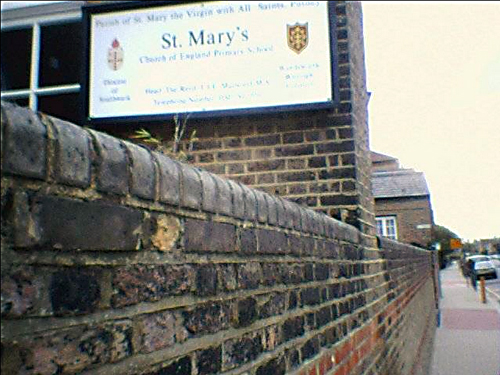
Other dates find The Detours at St. Mary's Hall, Putney (5th, 26th), the Oldfield Hotel in Greenford (11th, 14th, 16th, 18th, 21st, 23rd, 25th, 30th), the White Hart Hotel in Acton (12th, 19th) and the Glenlyn Ballroom on the 24th (opening for The Hollies) and the 31st (opening for The Big Three).
February 1964
New music releases: "Kissin' Cousins" - Elvis Presley; Hello, Dolly! - Carol Channing and Various Artists; The Third Album - Barbara Streisand; "A World Without Love" - Peter and Gordon
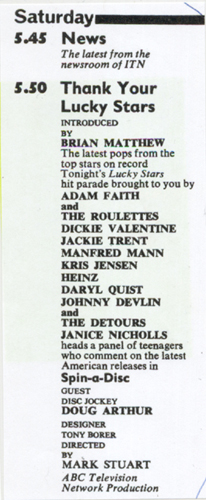
On the 1st, John tunes in to Thank Your Lucky Stars and sees another band called The Detours. This band, hailing from Liverpool, had formerly been known as Lee Curtis and The Detours, but became simply The Detours after Curtis left. Now they are riding a short-lived wave supplied to all the Mersey Beat groups by the success of The Beatles. John goes to Roger, Pete and Doug Sandom and breaks the news. With one group called "The Detours" already appearing on national television, they realize they will have to change the name of their band.
On the 2nd, the non-TV performing Detours appear at St. Mary's Hall in Putney opening for Dave Berry and The Cruisers. This is followed by the Oldfield Hotel in Greenford on the 6th, and the Goldhawk Social Club in Shepherd's Bush opening for The Kinks on the 7th.
Meanwhile, on the 7th, The Beatles touch down at Kennedy International Airport (recently renamed after the President's assassination), officially beginning what will later be dubbed the "British Invasion" of America. The invasion will spread around the world and ultimately provide a pathway to international fame for a group now little-known outside the Shepherd's Bush area of London.
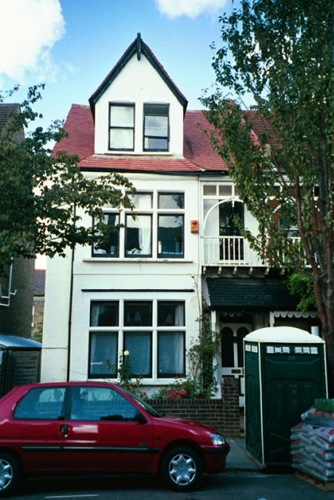
That same evening, after the Goldhawk Social Club show, Roger drives the band's van to the art school flat on Sunnyside Road Pete shares with friend and fellow student Richard Barnes. Roger, Pete, John and drummer Doug Sandom discuss band names in the van for a long time before they all go into the flat. Barnes, who is also present, later recalls: "The first two names that I thought of were 'the Group' and 'the Name.' Pete came up with 'The Hair.' Another contender was 'No-One,' or 'Ladies and Gentlemen, the next group is called "The Group."' But I finally thought 'The Who' worked best for many reasons. It made people think twice when they saw it and it worked well on posters because it was so short and therefore would print up so big...it narrowed down to a choice between either 'The Who' or 'The Hair.' Pete suggested 'The Hair and The Who' and seemed really keen on it, but it sounded too much like the name of a pub...The indecision was resolved by Roger who came around to the flat the next morning to pick Pete up...'It's The Who, innit?' So that was that and a new name had been born."
"The Who" may have been born on the 8th, but it spends a few more nights as The Detours before the new name is used. On the 9th, The Detours open for The Big Three at St. Mary's Hall in Putney, play the Oldfield Hotel in Greenford on the 13th and open for Carter Lewis and The Southerners at the Glenlyn Ballroom in Forest Hill on the 14th.
Around this time Pete and Richard Barnes lose the flat on Sunnyside Road and move into a converted ambulance where they live for three weeks before moving into the flat above Pete's parents.
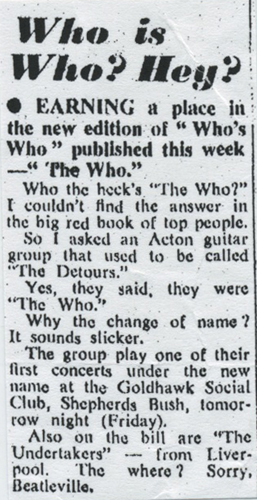
On the 20th, The Who play their first show under that name at the Oldfield Hotel In Greenford. Doug Sandom later recalls: "We finished our set and Lou took the mike and said, 'Who's up here next week?' and they're all going 'The Detours,' and he's going 'The Who,' and they're going 'The Detours,' and he's going 'The Who,' you know, and it was ridiculous."
The Who continue with more shows at the Oldfield Hotel on the 22nd and 27th, St. Mary's Hall in Putney opening for The Tremeloes on the 23rd, the Goldhawk Social Club on the 28th, and the Evershed Sports Pavilion on Harlequin Avenue in Brentford on the 29th.
March 1964
New music releases: "Twist and Shout" - The Beatles; "My Guy" - Mary Wells; "Can't Buy Me Love" - The Beatles; "Do You Want to Know a Secret?" - The Beatles
Dates for the newly dubbed The Who are the 1st at St. Mary's Hall in Putney, the Oldfield Hotel in Greenford (5th, 17th, 19th, 26th), the Goldhawk Social Club in Shepherd's Bush opening for The Undertakers (6th), Mead Hall in Ealing (7th), again at St. Mary's Hall (8th), the White Hart Hotel in Acton (15th), the Glenlyn Ballroom in Forest Hill (16th) and again at the Goldhawk Social Club on the 27th.
On the 4th, Pete fills in another form requesting an audition for the BBC Light Programme, this time under the name "The Who."
On the 7th, The Who are hired for the wedding reception of Joan Wilson whose brother Harry played drums with The Detours in 1963. The reception takes place at the Old Oak Common Institute in Shepherd's Bush.
On the 12th, Mary M. Cotgrove of the BBC's Light Entertainment Division notes that "The Who" who requested an audition is the same group as "The Detours" that have been turned down before. "As you can appreciate, we are kept quite busy in this office dealing with a considerable amount of correspondence and it does not help us if we have to go twice over the same ground. Would you be good enough to ask 'The Detours' to decide by the 9th April, and let us know on that day, which name they wish to continue to be known by."
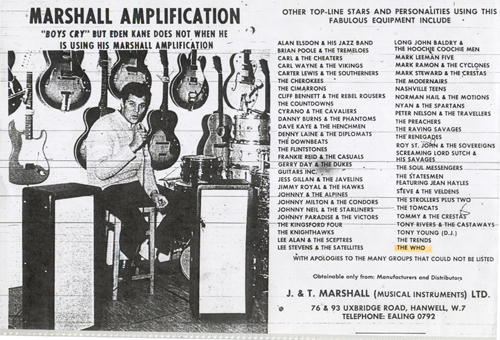
On the 14th, Melody Maker has an ad for Marshall Amps citing The Who as clients.
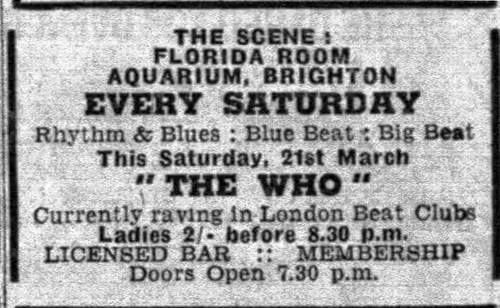
On the 21st, The Who have what is probably their first date in Brighton. They are at the Florida Room next to the Brighton Aquarium.
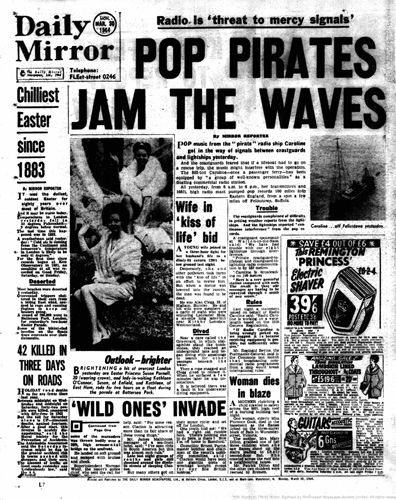
On the 28th at Noon, the first pirate radio station, Radio Caroline, begins broadcasting from a ship off the British coast. This commercial radio station uses its location in international waters to circumvent the government-owned and commercial-free BBC radio, then a stodgy institution almost totally adverse to playing British and American rock 'n' roll. With Radio Caroline's success, a literal fleet of pirate radio stations, playing all the latest rock 'n' roll, soon take to the air.
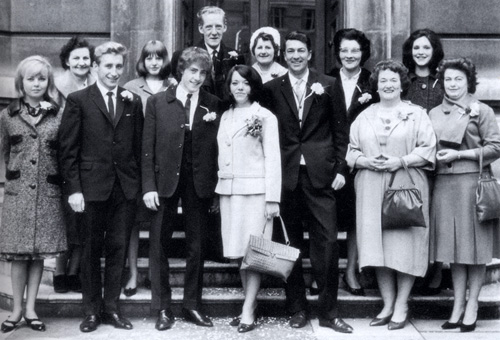
Also on the 28th, Roger marries his four-month pregnant 16-year old girlfriend Jacqueline Rickman at Wandsworth Registry Office. Johnny Kidd and The Pirates are guests at the reception but no other member of The Who attends. News of Roger's marriage will be kept secret from The Who's fans until 1968 when Jacqueline files for divorce.

No time for honeymoons as The Who are back to Brighton the next day, playing an all-night rave at the Florida Room.
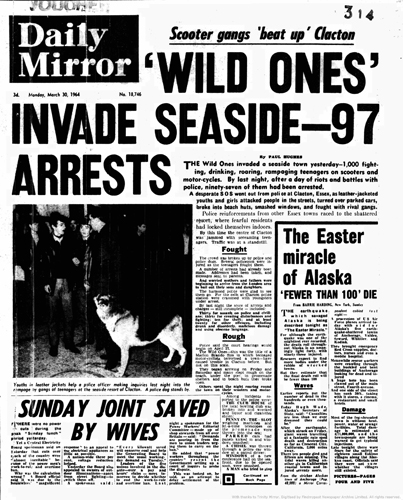
On Easter weekend (28th, 29th), scuffles break out between Mods and Rockers at the British seafront town of Clacton. The British press expands the scuffles into "riots" with cries of "hooliganism!" and mass arrests. Mod, then a little-known London cult, gains national fame as a result of the coverage.
April 1964
New music releases: The Beatles' Second Album - The Beatles; "Viva Las Vegas!" - Elvis Presley; The Rolling Stones - The Rolling Stones; Funny Girl - Barbra Streisand, Sydney Chaplin and Various Artists
Around this time The Who get their first manager, later described by the band as "a Jewish doorknob seller" named Helmut Gorden with dreams of being the next Brian Epstein. He buys The Who a van, new clothes and (imitation) leather jackets.
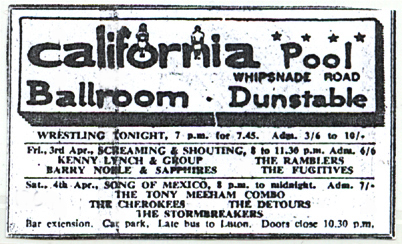
The Who play the Oldfield Hotel in Greenford on the 2nd, the Glenlyn Ballroom in Forest Hill on the 3rd and 6th and the White Hart Hotel in Acton on the 5th. They even play one leftover date as "The Detours", opening for the Tony Meehan Combo, at at the California Ballroom in Dunstable on the 4th.
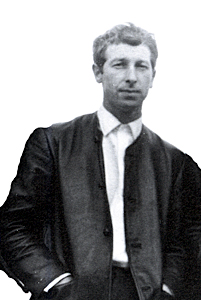
On the 9th, The Who audition for Chris Parmeinter of Fontana Records in the Zanzibar Café on the Edgware Road. Parmeinter is impressed by Pete, Roger and John, but does not care for drummer Doug Sandom. Pete explodes angrily at Doug so Doug quits the band although he agrees to stay on through the weekend. From there, The Who go to Studio S2 at Broadcasting House to audition for an appearance on the BBC Light Programme.
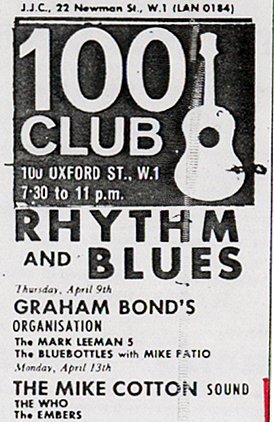
On the 10th, The Who return to the Glenlyn Ballroom opening for The Undertakers on the 10th and the Goldhawk Social Club in Shepherd's Bush opening for Wee Willie Harris on the 11th. The show of the 13th is at the 100 Club on Oxford Street in London supporting The Mike Cotton Sound. It is Doug's last date playing drums with The Who.
Also on the 13th, Pete writes a letter to the BBC apologizing for applying twice for a position on the BBC Light Programme, once as The Detours and once as The Who. He confirms that they are now called The Who.
Pete later recalls that during this month his late-night gigs caused a lecturer at his art college to ask about his health since he was obviously tired and distracted. Pete confessed to playing in a band but when the lecturer learned what he was earning, he urged Pete to quit school and pursue music full-time.
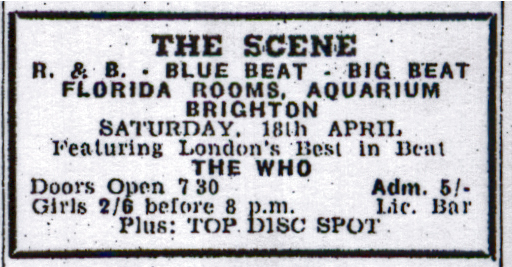
On the 16th, The Who return to the Oldfield Hotel with drummer Dave Gold from Marshall's Music Shop. Over the next couple of weeks, The Who will go through a succession of quickly hired replacement drummers including a young Mitch Mitchell, later of The Jimi Hendrix Experience. Known dates are the Goldhawk Social Club on the 17th, the Florida Rooms in Brighton on the 18th, the Glenlyn Ballroom on the 20th and 24th, the latter supporting The Merseybeats, the Oldfield Hotel on the 23rd, the White Hart Hotel on the 26th and the 100 Club, again supporting The Mike Cotton Sound, on the 27th.
On the 28th, The Who hear from the BBC. It's a letter of rejection for the BBC Light Programme.
Around this time, the last piece of The Who puzzle is added. Pete, Roger, John and promoter Bob Druce remember that, while The Who were playing a show with some old drummer, "an impudent geezer" with "his hair dyed ginger wearing a ginger suit and holding a glass of brown ale" loudly announces that he can play better than their drummer. The Who invite the upstart onstage where he plays wildly to "Roadrunner" and succeeds in breaking the old-timer's drum pedal.
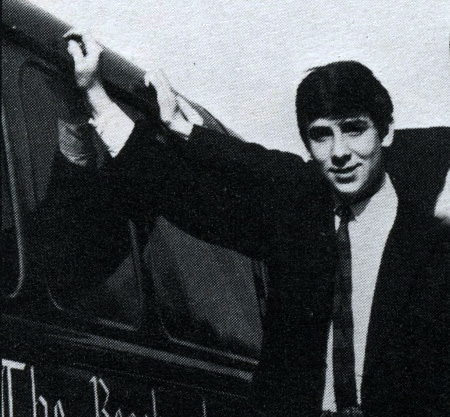
That impudent geezer, of course, is Keith Moon. Unfortunately, when Moon biographer Tony Fletcher researched the story, he found that the Beachcombers, the group Keith was in at the time, have no memory of his ever having dyed his hair and none of the club's regulars ever remember seeing Keith's live audition. In addition, the manager of the Oldfield Hotel at the time clearly remembers Keith stopping by on a Tuesday to see if any groups were looking for a new drummer. Told The Who were indeed so bereft and were rehearsing that night at a drill hall in Acton, Keith hurried off to meet his destiny.
As with so much of The Who's history, one can get only so close to the truth and no closer. If you believe The Who's story, the date of the event was probably their performance at the Oldfield Hotel on the 30th. If you believe the Oldfield Hotel manager's story, it would be the 28th.
May 1964
New music releases: "I Get Around" - The Beach Boys; Hello, Dolly! - Louis Armstrong; Cotton Candy - Al Hirt; The Academy Award-Winning "Call Me Irresponsible" and Other Hit Songs from the Movies - Andy Williams
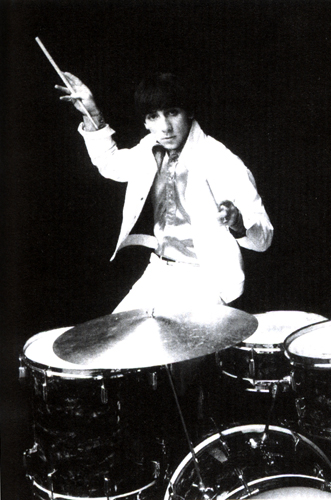
May 2nd is Keith's first official date with The Who playing a girl's 21st birthday party upstairs in a pub on the North Circular. John is amazed to see Keith tie his drums together with rope but understands when he sees him play.
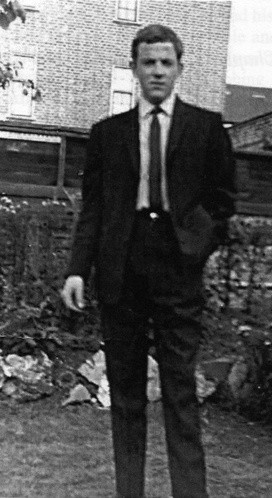
For help refashioning the band into hitmakers, The Who's manager Helmut Gorden brings in Peter Meaden, a former employee of The Rolling Stones' impresario, Andrew Loog Oldham. Meaden, a pill-popping Mod, has recently left Oldham's employ under bad circumstances and is now looking for a group to refashion as Mods to appeal to London's growing Mod cult.
On the 4th, The Who play at Glenlyn Ballroom in Forest Hill. Drummer Brian Redman (formerly of The Fourmost) sits in to warm up for the next day's audition, again for Chris Parmeinter of Fontana Records as well as Jack Baverstock at the same basement café where they had auditioned April 9. Both Keith and Brian Redman perform "I'm The Face" and, although manager Gorden objects, Pete, Roger and John already know they must use Keith.
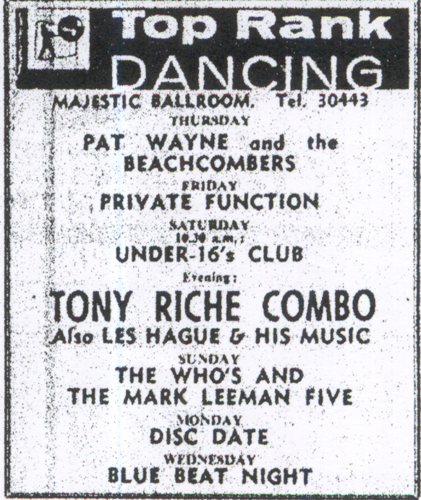
The Who get back to the tiny stages, playing the Oldfield Hotel in West London on Thursdays (7th, 14th, 21st and 28th), the Goldhawk Social Club in Shepherd's Bush on the 8th, The Florida Rooms in Brighton on the 10th, 16th and 17th (an all-night rave), back to the Glenlyn Ballroom on the 15th and 25th, the Majestic Ballroom in Luton on the 24th, and the White Hart Hotel in Acton on the 31st.
On the 11th, The Who record their first record at I.B.C. Studios, London. Peter Meaden takes Slim Harpo's "Got Love If You Want It," tarts it up with Mod lyrics and renames it "I'm The Face". This take exists as an acetate but has not been released to date.
During the weekend of the 16th, when The Who play Brighton, the Whitsun Bank Holiday riots between Mods and Rockers take place. Photos of Mods and Rockers smashing each other on the Brighton seaside inflame the British public.
The press also reports a sad incident connected with the Mod invasion. The body of a 17-year old Mod named Barry Prior is discovered in the surf below a cliff on which his empty sleeping bag is found. Pete will read the story of this apparent suicide and, nine years later, use it as the basis for his work Quadrophenia.
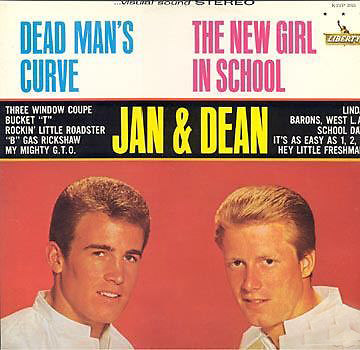
The first of two records of import released this month are Tommy Tucker's "Long Tall Shorty" on the 16th. It will become a live staple of the early Who. Also hitting the U.S. charts on the 23rd is Jan and Dean's LP Dead Man's Curve, a Keith favorite, from which he will pull the duo's arrangement of "Bucket T" for The Who to cover in 1966.
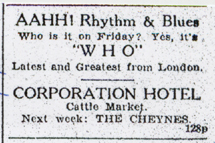
After an out-of town gig at the Corporation Hotel in Derby on the 29th, The Who's van, a Dormobile, blows up. Gorden shells out for a low-powered Commer diesel as replacement.
On the 31st, Pete, Peter Meaden and Richard Barnes attend a Chuck Berry/Gene Vincent/Carl Perkins concert at the Hammersmith Odeon, which Barnes remembers as one of the first large gatherings of Mods he and Pete had seen.
June 1964
New music releases: A Hard Day's Night - The Beatles; "The House of the Rising Sun" - The Animals; "Everybody Loves Somebody" - Dean Martin; "Under the Boardwalk" - The Drifters

The Who continue to perform in the London area playing the Glenlyn Ballroom in Forest Hill (1st, 8th, 15th, 22nd), the White Hart Hotel in Southall, Middlesex (4th, 11th, 18th, 25th, 29th), Granby Halls in Leicester (the 'Kinky' ball - 19th), and The Refectory in Golders Green (26th). This is The Who's last show at the Refectory as it marks their first banning, the result of turning their amps up after a request to turn them down.
On the 4th, The Who are back at I.B.C. Studios, London to record Pete's art school composition "It Was You", previously recorded when the band was called The Detours. This performance also exists as an acetate but has not yet been released.
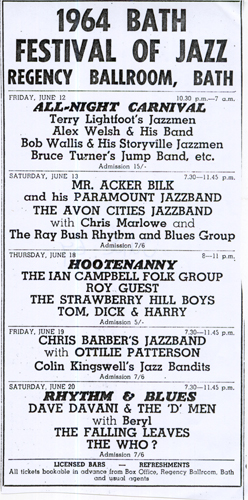
The Who do take three trips out of town, playing the Florida Rooms in Brighton on the 7th and 28th, and the Regency Ballroom in Bath on the 20th. At the bill on the 28th, The Who are billed as "The High Numbers".
During the month, The Who go to Philips Studios in London for their first studio session released to date. "I'm The Face", "Zoot Suit" and a cover of Bo Diddley's "Here 'Tis" are put to tape. Jack Bavistock produces. Manager Helmut Gorden and Pete's childhood friend Jack the barber provide handclaps, Pete's friend Richard Barnes plays maracas on "Here 'Tis" and all and sundry sing the backing vocals.
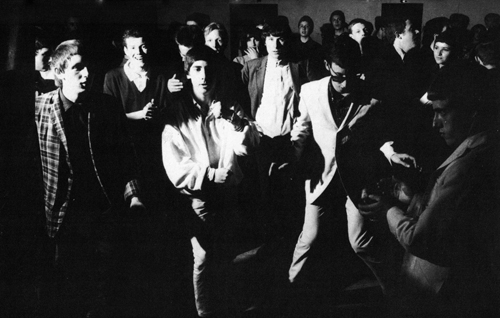
Also during the month, Peter Meaden kits out The Who in the latest mod fashion for a series of photo shoots. One sequence shows them dancing at The Scene Club.

On the 30th, The Who play their first show at the Bluesday Club at the Railway Hotel in Harrow/Wealdstone. Although they had played at the hotel twice before in 1963 as The Detours, this date is the first of a series of dates at the hotel that will provide the nucleus of The Who's Mod following and be immortalized on the inner gatefold jacket of Meaty, Beaty, Big & Bouncy.
July 1964
New music releases: Something New - The Beatles; "Dancing In the Street" - Martha Reeves & The Vandellas; "A Hard Day's Night" - The Beatles; The Best of Jim Reeves - Jim Reeves
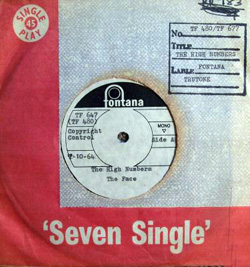
On the 3rd, "Zoot Suit" backed with "I'm The Face" and listed as by "The High Numbers" is released on Fontana Records. Derek Johnson in New Musical Express says, "The High Numbers are highly topical with their novelty lyric about male attire, 'Zoot Suit.' Medium twister, but with an inconsequential tune. Harmonica leads into broken-beat unison vocal on 'I'm The Face.' Compelling styling, but weakish material." Record Mirror, however, gives the single a rave, calling "Zoot Suit," "an ultra-commercial blues-flavoured dance tune that grows and grows on you." Disc gives it 3 stars out of 5 but remarks "the tunes are almost non-existant." Only 1,000 discs are pressed and although members of The Who fan club write to pirate radio stations, using assumed names on multiple letters, asking for the songs to be played, the single fails to get airplay or generate sales.
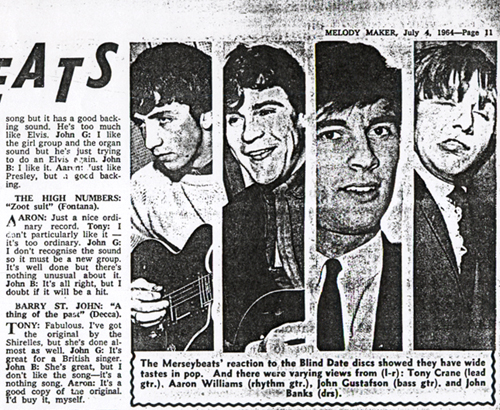
The next day The Merseybeats review "Zoot Suit" during a "Blind Date" blind listening session for Melody Maker. Aaron Banks: "Just a nice ordinary record." Tony Crane: "I don't particularly like it -- it's too ordinary." Johnny Gustafson: "I don't recognize the sound so it must be a new group. It's well done but there's nothing unusual about it." John Banks: "It's all right but I doubt it will be a hit." In little more than a year, The Merseybeats will be opening for the group they review.
On the 7th, still billed as "The Who", the group performs at the Railway Hotel in Harrow & Wealdstone.
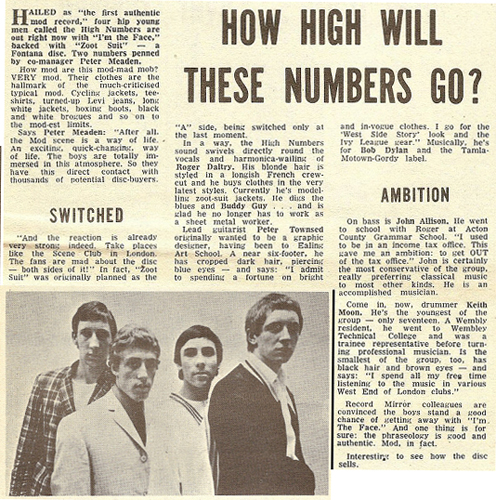
On the 11th, The High Numbers get one of their first national articles in Record Mirror under the headline "How High Will These Numbers Go?"
That night, "The Who" open for Chris Farlowe and The Thunderbirds at the Trade Union Hall in Watford, Herfordshire. The next night, it's "The High Numbers" who give their first live performance under that name at The Florida Rooms in Brighton.
On the 13th, Academy Award-winning director John Ford begins production of his movie Young Cassidy in Ireland. Production assistant Chris Stamp works on the film to fund his business partners Kit Lambert and Mike Shaw who have been scouting London's nightclubs for the last few months looking for a visually interesting unknown band. Lambert and Stamp's idea is to manage the band to stardom while making a film of the process.
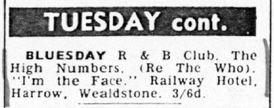
On the 14th, the group, now billed as "The High Numbers", return to the Railway Hotel. Kit Lambert, a posh young man looking quite out of place in a Saville Row suit, watches The High Numbers noisily bash away at their songs between bouts of arguing between themselves. He later says they projected "an evil excitement." Lambert immediately calls Stamp telling him they have found their band.
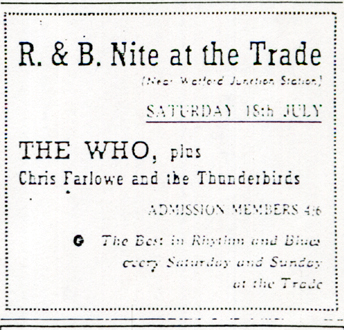
Probably on the 18th, Stamp flies over from Ireland to see the new discovery as Chris Farlowe and the Thunderbirds open for The Who at the Trade Union Hall in Watford. It also may have been at this show that Stamp is accompanied by fellow Young Cassidy crewmember and potential investor Michael Douglas, son of Kirk Douglas. Michael declines to invest in this noisy London band.
On the 19th, The High Numbers audition for Lambert, Stamp and Mike Shaw at a gymnasium at Holland Park Comprehensive School in the Campden Hill Road, West London. Needless to say, they pass the audition. From there they catch the 5:15 to play the Florida Rooms in Brighton.
According to Pete, also around this time, Pete Meaden, in an effort to keep some control over The High Numbers, has them audition for Andrew Loog Oldham, manager of the Rolling Stones, at The New Carlton Irish Club in Shepherd's Bush. Kit Lambert unexpectedly shows up. Oldham turns the High Numbers down, leaving the way clear for Lambert and Stamp to take over the group. Pete Meaden agrees to relinquish his part of the control of the group for a payment of £250. Meanwhile manager Helmut Gorden, on vacation in the Seychelles, receives a letter informing him his services will no longer be needed. He immediately launches legal action but fails when it is pointed out that the group members who signed his contract were underage.
On the 21st, The High Numbers play the Railway Hotel and another show there on the 28th. According to Chris Downing, during one of these dates, former manager Helmut Gorden repossesses the High Numbers' van during the show.
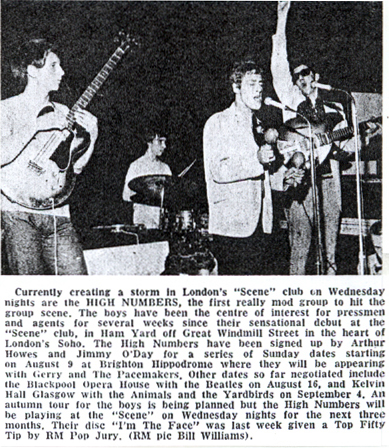
Starting on the 22nd, The High Numbers receive their parting gift from Pete Meaden, a five-week residency on Wednesdays at the Scene Club. An article in Record Mirror on the 25th mentions the residency.
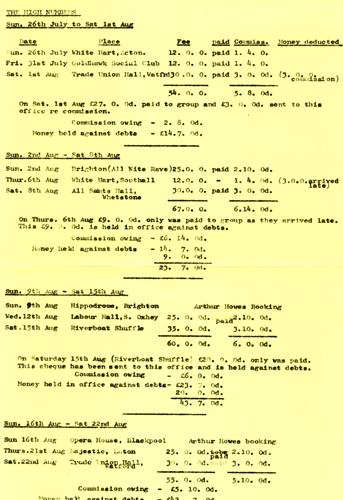
Other dates for the month are the Trade Union Hall in Watford on the 25th, the White Hart Hotel in Acton on 26th (for which the band is paid £12), the Scene Club on the 29th, and the Goldhawk Social Club on the 31st opening for The Kinks (again receiving £12).
August 1964
New music releases: "Oh, Pretty Woman" - Roy Orbison; "You Really Got Me" - The Kinks; "Fly Me to the Moon" - Frank Sinatra; Another Side of Bob Dylan - Bob Dylan
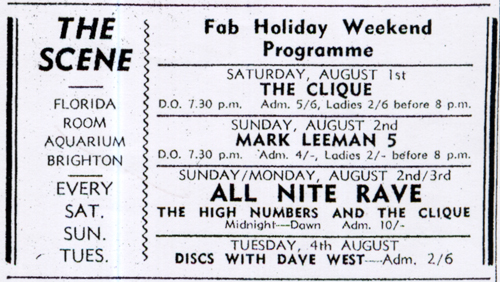
The High Numbers, in their first full month with that name, kick off at the Trade Union Hall in Watford, then head to the seaside for an all-nighter at The Florida Rooms in Brighton on the 2nd with The Clique. Adrian Stambach, bassist for The Clique, recalls being impressed by John using his fingers instead of a plectrum to play the bass. Roger was "quite frightening" growling through "Smokestack Lighning" and "I'm a Man". He also recalled Pete using feedback and performing "windmills" but not yet smashing his guitar.
On the 4th they are back at the Railway Hotel at the Harrow & Wealdstone train stop and The Scene Club in London's Soho on the 5th. The 6th sees them at the White Hart in Southall although when they are seen, they're late, and lose £3 of their £9 price for tardiness. After that is a pricey £30 gig at the All Saints Hall in Whetstone on the 8th.
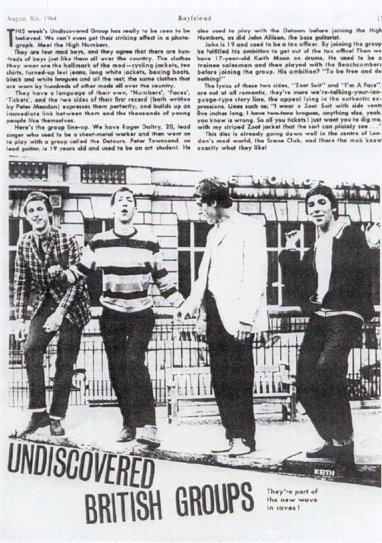
Also on the 8th, Boyfriend magazine does a one-page feature on The High Numbers, naming the members as Roger Daltry (ex-sheet-metal worker), Peter Townsend (ex-art student), John Allison (ex-tax officer) and Keith Moon (ex-trainee salesman). Keith says his ambition is "to be free and do nothing!"
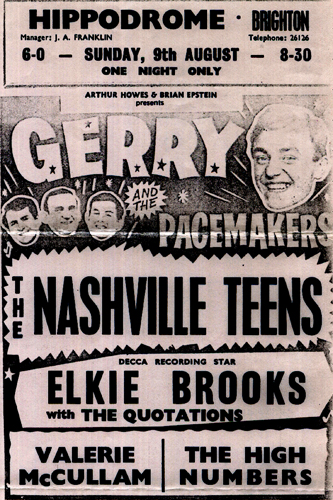
On the 9th, The High Numbers open for Gerry & The Pacemakers at the Hippodrome in Brighton. This is the first of a series of bookings supplied by Arthur Howes that provide the band exposure as they warm up the stage for better-known acts. Howes may have almost immediately regretted supplying the gigs after he enlists the High Numbers to not only play a set of their own but also to provide backup for singer Valerie McCullam. Moon develops a loathing for the singer and buys a toy cymbal to make a loud "plink" at inappropriate points in her act.
On the 11th, The High Numbers return to the Railway Hotel for their first filmed recording. Kit Lambert shoots forty minutes of 16mm film of the band performing before dancing Mods. Apparently there was trouble that evening down at Roger's house. Right before the show, Roger's father-in-law drags Roger outside and hits him. Roger dons sunglasses for the shoot to cover up the black eye. Footage from the shoot first appears edited into 1965's "I Can't Explain" video, the audio is released in the 1980's on a bootleg called Dance to Keep From Crying and two songs, "I Gotta Dance to Keep From Crying" and "Ooh Poo Pah Doo", appear with sound and video in the 2007 movie Amazing Journey: The Story of The Who.
The next night the Numbers are at The Mine, Carpenders Park Station in South Oxhey near Watford and from there go to The Scene Club for a late show. On the 15th, the band takes to the river for a summer dance on a riverboat departing from Charing Cross Pier. The dance is sponsored by Hoover, the vacuum cleaner company. Joining them on the cruise is the South Beats containing member Alan Oates who will become The Who's assistant road manager the next year.
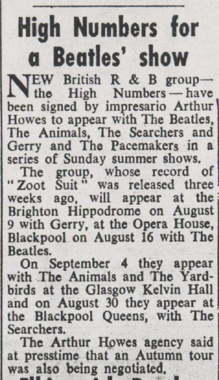
On the 16th, The High Numbers follow The Kinks, then super-hot with their new song "You Really Got Me", and open for The Beatles, all during one Sunday night at the Blackpool Opera House. It is one of only two times that the band plays the same venue as the Liverpudlian Four. More than one writer has suggested that John Lennon takes the idea of using feedback at the beginning of that November's Beatles single "I Feel Fine" from watching Pete's feedback-laden performance on this night.
Between the two performances that evening, Pete looks out from backstage to see ushers sniffing through the rows looking for seats where girls got a bit too excited after seeing The Beatles and spraying the "accidents" with cologne, an image Pete stores away for nine years before using it for the opening verse of "5:15".
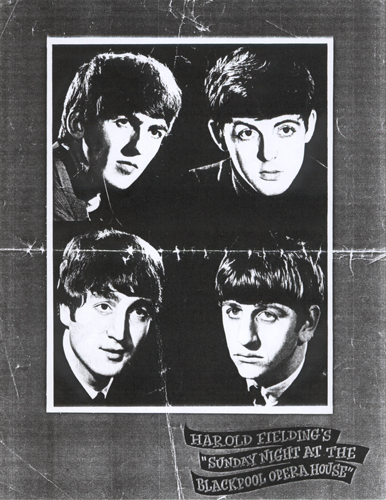
The High Numbers manage to make an impression despite the strong competition thanks not only to their performance but also to new professional stage lighting designed for them by Mike Shaw. When The High Numbers leave the stage, their Marshall stacks are removed and replaced with the Beatles' equipment. John Entwistle later remembers the Beatles' amps as half the size of what The High Numbers are already using. After the show the Numbers get a taste of Beatlemania as hysterical Beatle fans attack them as they leave the show, desperate for any souvenir of any band, ripping off pieces of their clothing and unknowingly ending up with Who collectibles.
On the 19th, The High Numbers are back at The Scene Club before traveling the next day to Studio 3 at the BBC Television Centre in Wood Lane to record their television debut for the BBC-2 show The Beat Room, broadcast on the 24th. The High Numbers perform Bo Diddley's "Bring It to Jerome" and The Miracles' "I Gotta Dance to Keep from Crying".
On the 20th, The High Numbers play the Majestic Ballroom in Luton earning £25. Their opening act is The Clique.
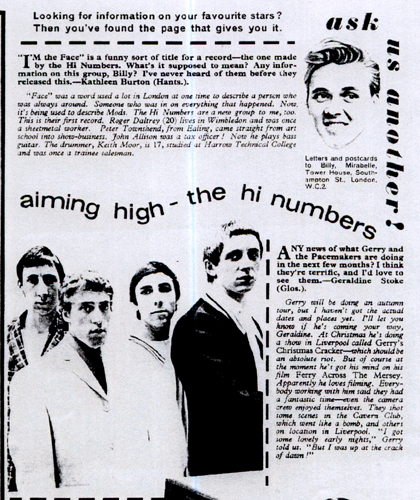
On the 22nd, Mirabelle answers questions about the meaning of "Face" in "I'm The Face" and gives a little backstory on The High Numbers in their latest issue.
Also on the 22nd Roger becomes the first member of the band to become a father as his son Simon is born at the Downs, Wimbledon. The proud father celebrates that night by singing with his band at the Trade Union Hall in Watford.
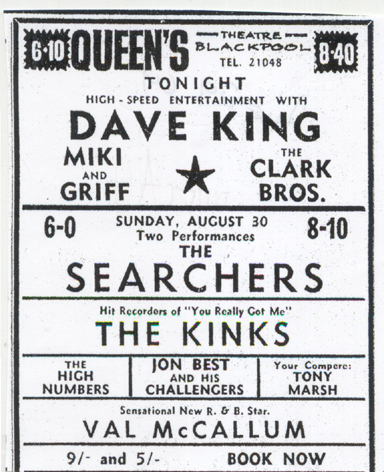
Other dates for this month have the High Numbers 4th billed behind Dusty Springfield at the Hippodrome in Brighton (23rd), returing to the Railway Hotel (25th) then the Scene Club (26th) and finishing the month back in Blackpool at the Queen's Theatre supporting The Kinks and The Searchers (30th).
September 1964
New music releases: "Baby Love" - The Supremes; People - Barbra Streisand; "Ain't That Loving You Baby" - Elvis Presley; "L-O-V-E" - Nat King Cole
The High Numbers start the month off on the 2nd at The Mine at Carpenders Park Station followed by The Scene Club.
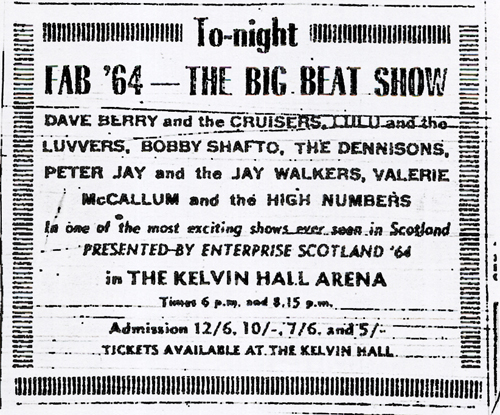
On the 4th, they make their first trek into Scotland to play Kelvin Hall Arena in Glasgow opening for Dave Berry & the Cruisers and Lulu & the Luvvers. Roger remembers going to a party afterwards at Lulu's mother's house.
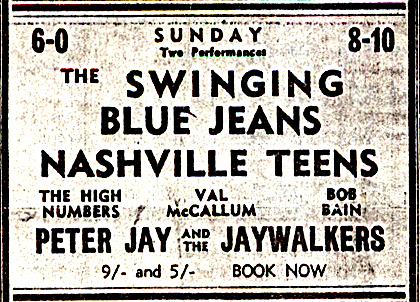
On the 6th, the Numbers are back down south at the Queens Theatre in Blackpool supporting the Swingin' Blue Jeans and the Nashville Teens.

On the 8th and the 15th, The High Numbers return to the Railway Hotel where some additional filming of their act is done to add to the August shoot. Additional Tuesdays in their residency are the 22nd and 29th.
On the 11th, Marvin Gaye's single "Baby Don't You Do It," later to be recorded and performed by The Who in both 1965 and 1971, is released in the U.S.
Additional High Numbers dates for the month are the Trade Union Hall in Watford (19th), and the Town Hall in Greenwich (23rd and 30th). Kit Lambert got the Numbers booked in Greenwich in a failed attempt to expand their base beyond London. Part of that failure was advertising the group with a flyer reading "The High Numbers - The Worst in Family Entertainment". According to reports, some people thought the name The High Numbers meant Bingo would be played!.
October 1964
New music releases: Fiddler on the Roof - Original Broadway Cast; Wednesday Morning, 3 AM - Simon & Garfunkel; "All Day and All of the Night" - The Kinks; My Fair Lady - Original Soundtrack
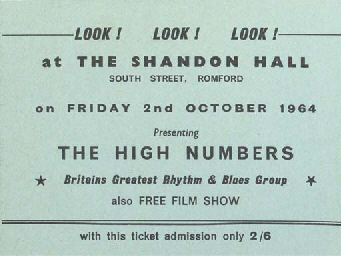
Catch The High Numbers this month at the Shandon Hall Dance Club in Romford, Essex (2nd), the Corn Exchange in Rochester, Kent (5th), the Railway Hotel at the Harrow & Wealdstone train stop (6th), The Mine at Carpenders Park Station (7th), the Olympia Ballroom in Reading (10th), Wolsey Hall in Chestnut (11th), the Trade Union Hall in Watford (13th), the Town Hall in Greenwich (14th), back to the Trade Union Hall in Watford (18th), back to the Corn Exchange (19th), back to the Railway Hotel (20th), Leo's Cavern at the Olympia in Reading (24th, billed as "The High Numbers - The Who," and 27th), the Town Hall in Greenwich (28th) and the Ricky-Tick Club in Windsor, Berkshire (30th).
Early in the month, The High Numbers audition for EMI at Studio 3 of The Beatles' hangout, Abbey Road. They record several cover tunes including "Smokestack Lightning." The tape is released as an instrumentals only bootleg in the 2000's.
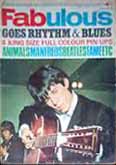
On the 10th, Fabulous magazine runs an article on the High Numbers written by June Southworth. John's last name is given as Allison who "plays rhythm guitar."
On the 14th, Pete's song "It Was You", written as a class assignment in art college, is sold to Dick James Publishing with Eula Parker and Barry Gray receiving 25 percent each and a credit for co-authorship on future releases. Pete's father Cliff signs for him. The songwriter's address is given as 30 Disraeli Road, Ealing WS.
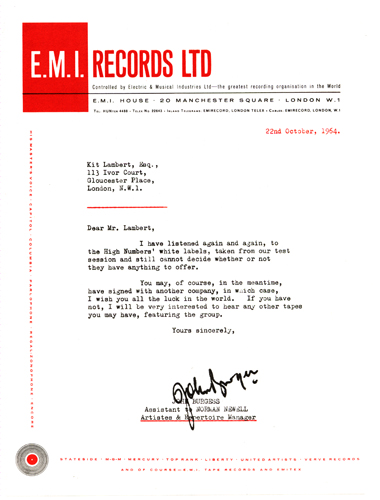
On the 22nd, Lambert receives a letter of rejection of The High Numbers from EMI. The rejection letter is later included with the Live At Leeds album. Since the reason the group is rejected is their lack of original material, Kit and Chris set up Pete with a Vortexion reel-to-reel recorder and tell him to get writing.
From this time on almost all Pete's songs will be written and presented as completed demos, a style of presentation then unknown in England. His first pieces with the new system are a dance song called "You Don't Have To Jerk" and a male chauvinist/hot-rod song (meant to appeal to both Roger and Keith) named "Call Me Lightning."
On Halloween night the band performs at the Waterfront Club at the Cliff Hotel in Woolston, Southampton, Hampshire. It is the last show they play where they will be promoted as "The High Numbers."
November 1964
New music releases: "Blue Christmas"/"Santa Claus is Back in Town" - Elvis Presley; "You've Lost That Lovin' Feelin'" - The Righteous Brothers; "Downtown" - Petula Clark; "I Feel Fine" - The Beatles
Out with "The High Numbers", in with "The Who" as the band returns once and for all to that name with their show at the Railway Hotel on the 4th, they play The Mine at Carpenders Park Station, on the 7th, the Trade Union Hall in Watford and on the 9th, the Corn Exchange in Rochester.
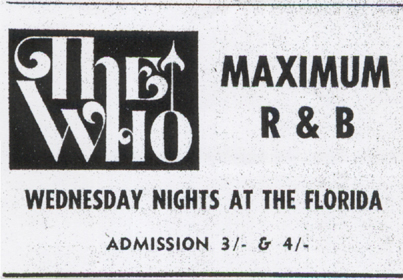
On the 7th, Who managers Kit Lambert and Chris Stamp place an ad for The Who in Melody Maker. It features the first known use of Richard Barnes' lettering of "The Who" and the slogan "Maximum R&B." Also in that issue is an address for The Who Fan Club. The Fan Club secretary is Jane Fearnley-Whittingstall who is also the Who's publicist and usually works out of Lambert & Stamp's office. In addition to a newsletter, subscribers can purchase badges, posters, and autographed pictures as well as tickets for television appearances and even occasional backstage passes.
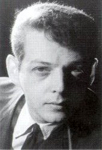
Having failed to sell The Who to a record label, Kit and Chris turn to The Kinks' producer Shel Talmy, having Pete write a song in the Kinks' style to present as a demo. This song, "I Can't Explain," is chosen by Talmy over Pete's other demo submission, "Call Me Lightning," for The Who's first single which Talmy records as an independent producer, then sells to Decca Records in the U.S. Around the second week of November, The Who go into the studio (The Who remember IBC Studios, Talmy clearly remembers Pye) and record "I Can't Explain". For the flip side, Talmy has the band record the African-American chain gang classic "Bald-Headed Woman" that Talmy is claiming as "author" due to the use of his arrangement (The Kinks had also been forced to record the song on their first album). Session guitarist Jimmy Page is present but does not play on the A-side, only the B because, according to John, Jimmy would not let Pete borrow his pedal to play some needed fuzz guitar. Another group, The Ivy League, are brought in to add backup vocals.
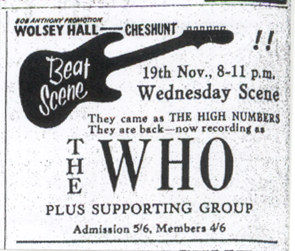
On the 14th, The Who play the Olympia Ballroom in Reading followed by Wolsey Hall in Cheshunt on the 18th, not the 19th as it says in the ad. The ad does, however, give a valuable piece of information as it reads "now recording as The Who".
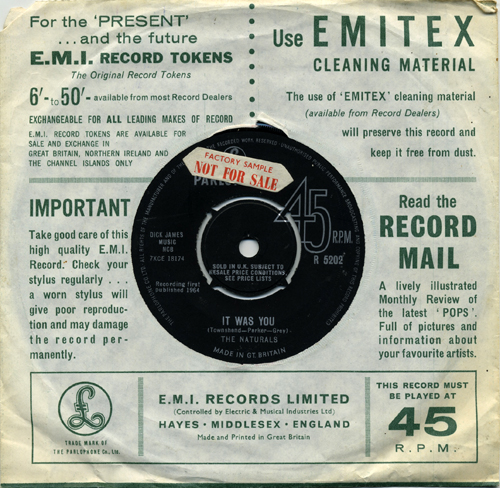
Before "I Can't Explain" can be released, Pete Townshend gets his first published song credit on the 20th on the flip side of an obscure single. The Naturals' release on Parlophone, "Look at Me Now" has Pete's song "It Was You" on the B-side. Credit is shared with Eula Parker and Barry Gray as part of the publishing deal with Dick James the previous month. The single fails to chart.
Also on the 20th, production begins in Norway on the Anthony Mann movie The Heroes of Telemark. As money is running short for The Who's managers, Chris Stamp takes a job as assistant on the film to keep The Who afloat.
On the 21st, The Who play the Ealing Club on Ealing Broadway in London. A scheduled show at the Goldhawk Social Club on the 22nd is canceled.
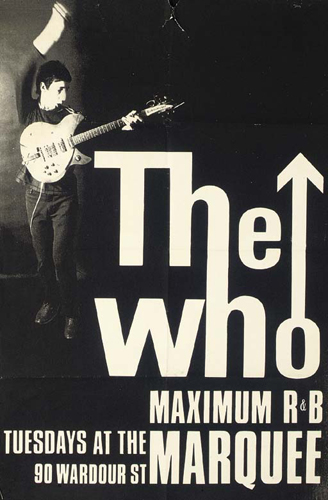
On the 24th, The Who get their first major London booking, a sixteen-week residency on Tuesday nights (the lowest-attendance night) at The Marquee Club. To advertise the show, Kit and Chris plaster the West End of London with black posters designed by Pete's friend Brian Pike featuring a windmilling Townshend, a large "The Who" logo, and the legend "Maximum R&B." Copies of this poster are later included in the Live At Leeds album and the design becomes The Who's first iconic image. Fewer than thirty people attend despite free tickets given to Who fans at the Railway Hotel and free whisky bought for the audience by Kit and Chris. The Sneakers open for The Who.
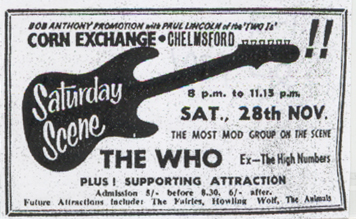
The next night, The Who hit the seaside, playing the Florida Room in Brighton followed by the Corn Exchange in Chelmsford, Essex (28th) and the Trade Union Hall in Watford (29th).
December 1964
New music releases: "My Girl" - The Temptations; Beatles '65 - The Beatles; Beatles For Sale - The Beatles; "You're Nobody Till Somebody Loves You" - Dean Martin
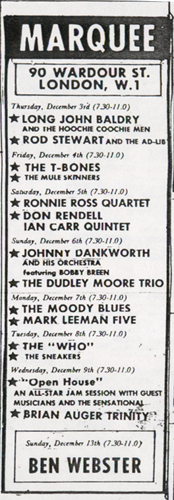
The Who begin their last month before they smash their way into national consciousness playing their second Tuesday at the Marquee Club in London on the 1st. 298 attend, 10 times as many as the previous week. Opening act on this date is The Clique. Other Marquee dates are the 8th, 15th, 22nd, and 29th. The Sneakers open for them at those dates except the 29th when The Boys open.
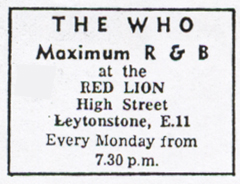
Other places to find this up-and-coming band are the Florida Room at the Aquarium in Brighton on Wednesdays (2nd, 9th, 16th, 23rd) and The Red Lion in Leytonstone on Mondays (14th, 21st, 28th).

On the 12th, The Who play a Student's Christmas Dance at Keith's old alma mater Harrow Technical College in London. Cathy McGowan, host of Ready Steady GO! sees the band here for the first time.

On the 12th, Billboard magazine has the first U.S. press mention of The Who in an article on Decca Records declaring that "I Can't Explain" backed with "Bald Headed Woman" will be "coming out this week". Four days later the first review appears in Variety followed by Cash Box on the 19th. Variety calls "I Can't Explain" a "typical rocking entry with a good sound." Cash Box gets confused, assuming "Bald-Headed Woman" is the A-side, and dismisses "I Can't Explain" as "an attention-getting shuffle-rock'er." It is unclear whether the single has its national release at this time but producer Shel Talmy said December 19 was the U.S. release date in a 2022 post on Facebook.
The latter half of the month sees The Who at these extra dates, the Waterfront Club at the Cliff Hotel in Southampton (18th), the Xmas Ball at the London College of Printing (19th), the Galaxy Club at the Town Hall in Basingstoke, Hampshire (Boxing Day), the Ealing Club (27th), and a New Year's Eve Dance at Pinner in Middlesex.